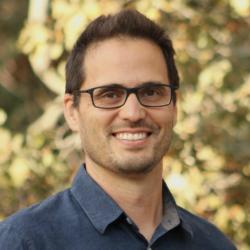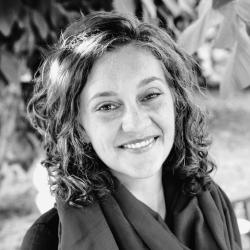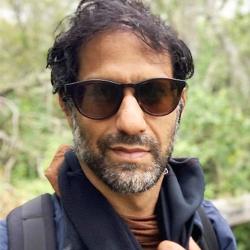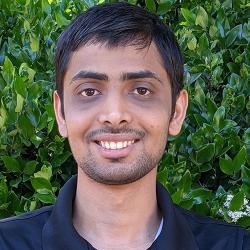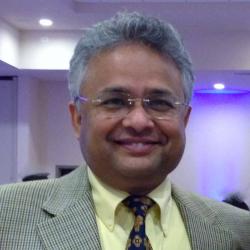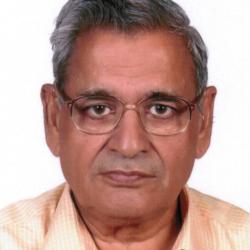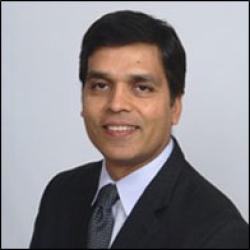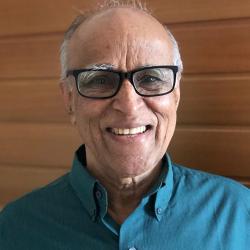Christopher Miller, PhD
MA Faculty Vice President of Academic Affairs, Professor of Engaged Jainism & Modern Yoga
Christopher Jain Miller is the co-founder, Vice President of Academic Affairs, and Professor of Jain and Yoga Studies at Arihanta Institute. He completed his PhD in the study of Religion at the University of California, Davis and is also a Visiting Researcher at the University of Zürich's Asien-Orient-Institut and Visiting Professor at Claremont School of Theology where he co-developed and co-runs a remotely available Masters Degree Program focusing on Engaged Jain Studies. His current research focuses on Engaged Jainism and Modern Yoga, and he is the author of a number of articles and book chapters concerned with Jainism and the practice of modern yoga. Christopher is the author of Embodying Transnational Yoga: Eating, Singing, and Breathing in Transformation (Routledge 2024), as well as co-editor of the volumes Engaged Jainism: Critical and Constructive Approaches to the Study of Jain Social Engagement (SUNY 2025) and Beacons of Dharma: Spiritual Exemplars for the Modern Age (Lexington 2020).
Learn More
Cogen Bohanec, PhD, an Assistant Professor at Arihanta Institute, received his doctorate in Historical and Cultural Studies of Religion from the Graduate Theological Union (GTU) in Berkeley, California where his research emphasized comparative dharmic traditions and the philosophy of religion. His dissertation was on Process and Dialectic in Hindu Thought with an emphasis on systematic Hindu theology and ethics, and he has a variety of publications in Jain, Hindu, and Buddhist studies.
Cogen also holds a Master of Arts in Buddhist Studies from the Institute of Buddhist Studies at the GTU where his research primarily involved the translations of Pāli Buddhist scriptures in conversation with the philology of the Hindu Upaniṣads. He is the editor of An Introduction to Jain Philosophy by Parveen Jain, PhD (DKPrintword, 2019). He is an adjunct professor in South Asian Culture and Religions and Sanskrit language at the GTU, teaches Asian humanities, world religions, and classical humanities at American River College in Sacramento, California; and is post-doctoral faculty member in Jain Studies for Arihanta Institute.
Learn More
Cogen also holds a Master of Arts in Buddhist Studies from the Institute of Buddhist Studies at the GTU where his research primarily involved the translations of Pāli Buddhist scriptures in conversation with the philology of the Hindu Upaniṣads. He is the editor of An Introduction to Jain Philosophy by Parveen Jain, PhD (DKPrintword, 2019). He is an adjunct professor in South Asian Culture and Religions and Sanskrit language at the GTU, teaches Asian humanities, world religions, and classical humanities at American River College in Sacramento, California; and is post-doctoral faculty member in Jain Studies for Arihanta Institute.
Jonathan Dickstein (PhD), an Assistant Professor at Arihanta Institute beginning May 2023, specializes in South Asian Religions, Religion and Ecology, and Comparative Religious Ethics. He received his doctoral degree in Religious Studies from the University of California, Santa Barbara, where he wrote his dissertation on ancient Indian animal taxonomies and their relevance for religious ritual and dietary practice. Jonathan’s current work focuses on Jainism and contemporary ecological issues, and accordingly extends into Critical Animal Studies, Food Studies, and Diaspora Studies.
Jonathan has published in a wide array of interdisciplinary journals on topics such as veganism and politics, yoga and diet, Jain veganism, and the ethic of nonviolence (ahiṃsa). Jonathan considers himself a scholar-practitioner, having spent many years not only in libraries but also in public advocating for justice for both humans and nonhumans alike.
Learn More
Jonathan has published in a wide array of interdisciplinary journals on topics such as veganism and politics, yoga and diet, Jain veganism, and the ethic of nonviolence (ahiṃsa). Jonathan considers himself a scholar-practitioner, having spent many years not only in libraries but also in public advocating for justice for both humans and nonhumans alike.
Brianne Donaldson, PhD Brianne holds the Shri Parshvanath Presidential Chair in Jain Studies at University of California, Irvine.
Brianne explores the implicit foundational beliefs that inform social inclusion and ethical action toward plants, animals, and marginalized people. She is the author of Creaturely Cosmologies: Why Metaphysics Matters for Animal and Planetary Liberation (2015) exploring Jainism and Whitehead’s process philosophy, and Insistent Life: Principles for Bioethics in the Jain Tradition (2021, co-authored with Ana Bajželj). She is the editor of Beyond the Bifurcation of Nature: A Common World for Animals and the Environment (2014), The Future of Meat Without Animals (2016; co-edited with Christopher Carter), and Feeling Animal Death: Being Host to Ghosts (2019; co-edited with Ashley King). Brianne holds the Shri Parshvanath Presidential Chair in Jain Studies at University of California, Irvine.
Learn More
Brianne explores the implicit foundational beliefs that inform social inclusion and ethical action toward plants, animals, and marginalized people. She is the author of Creaturely Cosmologies: Why Metaphysics Matters for Animal and Planetary Liberation (2015) exploring Jainism and Whitehead’s process philosophy, and Insistent Life: Principles for Bioethics in the Jain Tradition (2021, co-authored with Ana Bajželj). She is the editor of Beyond the Bifurcation of Nature: A Common World for Animals and the Environment (2014), The Future of Meat Without Animals (2016; co-edited with Christopher Carter), and Feeling Animal Death: Being Host to Ghosts (2019; co-edited with Ashley King). Brianne holds the Shri Parshvanath Presidential Chair in Jain Studies at University of California, Irvine.
Ellen Gough, PhD, is an assistant professor in the Department of Religion at Emory University. She received a PhD in Asian Religions from Yale University in 2015.
Most of her research takes an ethno-historical approach that combines the study of Gujarati, Hindi, Sanskrit, and Prakrit texts, the study of material culture, and fieldwork. Her book, Making a Mantra: Tantric Ritual and Renunciation on the Jain Path to Liberation (University of Chicago Press, 2021), examines the life of a single Jain mantra, from its origin at the outset of the first millennium, to its use in medieval mendicant initiations and meditative exercises, to its use in healing rites today. She is now working on projects related to Digambara festivals and Jain astrology.
Learn More
Most of her research takes an ethno-historical approach that combines the study of Gujarati, Hindi, Sanskrit, and Prakrit texts, the study of material culture, and fieldwork. Her book, Making a Mantra: Tantric Ritual and Renunciation on the Jain Path to Liberation (University of Chicago Press, 2021), examines the life of a single Jain mantra, from its origin at the outset of the first millennium, to its use in medieval mendicant initiations and meditative exercises, to its use in healing rites today. She is now working on projects related to Digambara festivals and Jain astrology.
Jeffery D. Long is the Carl W. Zeigler Professor of Religion, Philosophy, and Asian Studies at Elizabethtown College, in Pennsylvania where he has taught since receiving his doctoral degree from the University of Chicago Divinity School in the year 2000.
In 2021, Elizabethtown College gave Jeffrey its Ranck Award for Research Excellence. In 2018, he received the Hindu American Foundation’s Dharma Seva Award for his ongoing work to promote accurate, culturally sensitive portrayals of Indic traditions in the American education system and popular media. And in 2013, he gave the inaugural Virchand Gandhi Lecture in Jain Studies at Claremont University. He has also spoken on ahiṃsā at the United Nations. Jeffrey is the author of several books, including Hinduism in America and Jainism: An Introduction, and co-editor with Christopher Miller and Michael Reading for Beacons of Dharma, and with Michael Long for Nonviolence in the World’s Religions.
Learn More
In 2021, Elizabethtown College gave Jeffrey its Ranck Award for Research Excellence. In 2018, he received the Hindu American Foundation’s Dharma Seva Award for his ongoing work to promote accurate, culturally sensitive portrayals of Indic traditions in the American education system and popular media. And in 2013, he gave the inaugural Virchand Gandhi Lecture in Jain Studies at Claremont University. He has also spoken on ahiṃsā at the United Nations. Jeffrey is the author of several books, including Hinduism in America and Jainism: An Introduction, and co-editor with Christopher Miller and Michael Reading for Beacons of Dharma, and with Michael Long for Nonviolence in the World’s Religions.
Laura von Ostrowski studied Indology, Religious Studies and Romance Studies at LMU Munich. From 2015-2018 she was a fellow of the DFG Research Training Group “Presence and Implicit Knowledge” at FAU Erlangen-Nuremberg and received her PhD in Religious Studies in 2021.
The book to her PhD-thesis was published Open Access under the title “A Text in Motion” in 2022. Her areas of research include modern and contemporary yoga, the reception of the Yogasūtra, the history of German yoga and of the physical culture movement, contemporary religion, aesthetics and embodiment. Since 2007, she works as a yoga teacher with more than 1000 hours of training and has her own yoga studio in the center of Munich since 2018.
Learn More
The book to her PhD-thesis was published Open Access under the title “A Text in Motion” in 2022. Her areas of research include modern and contemporary yoga, the reception of the Yogasūtra, the history of German yoga and of the physical culture movement, contemporary religion, aesthetics and embodiment. Since 2007, she works as a yoga teacher with more than 1000 hours of training and has her own yoga studio in the center of Munich since 2018.
Patricia received her doctorate and master’s degree in Religious Studies from Pontifical Catholic University of Sao Paulo, Brazil, where she is currently a Professor of Religious Studies. Her dissertation was on Material Religion, a method to study religions from their empirical aspects, involving iconography, architecture, music, clothing, food and other bodily practices.
Her master’s degree’s research was about food practices and foodways in comparative religions. She is the author of the book Religion at the table. A sample of religions and their food practices, 2015 published in Portuguese, as well as of many other papers and book chapters.
Learn More
Her master’s degree’s research was about food practices and foodways in comparative religions. She is the author of the book Religion at the table. A sample of religions and their food practices, 2015 published in Portuguese, as well as of many other papers and book chapters.
Anand Jayprakash Vaidya is a professor of philosophy at San Jose State University and occasionally directs the Center for Comparative Philosophy. He was trained as an analytic philosopher from 1996 – 2005. His 2005 dissertation, The Epistemology of Metaphysical Modality, was a critical study of how we know what is possible and necessary via conceivability.
Anand works primarily in the areas of cross-cultural and multi-disciplinary philosophy of mind, epistemology, critical thinking, and ethics. His primary interest in this area is on Indo-Anglo-Analytic philosophy that engages cognitive science. He has taught many courses from Asian philosophy to ethical theory to logical theory. In addition to regularly teaching in his research areas, he also teaches business ethics, the philosophy of economics, and theories of justice. He is the co-editor of Business in Ethical Focus: An Anthology, 2nd Edition (Broadview Press, 2016). Visit Anand’s website to learn more.
Learn More
Anand works primarily in the areas of cross-cultural and multi-disciplinary philosophy of mind, epistemology, critical thinking, and ethics. His primary interest in this area is on Indo-Anglo-Analytic philosophy that engages cognitive science. He has taught many courses from Asian philosophy to ethical theory to logical theory. In addition to regularly teaching in his research areas, he also teaches business ethics, the philosophy of economics, and theories of justice. He is the co-editor of Business in Ethical Focus: An Anthology, 2nd Edition (Broadview Press, 2016). Visit Anand’s website to learn more.
Steven M. Vose is a scholar of Jain traditions focusing on the Śvetāmbar communities of western India from the late medieval era to the present. He approaches the study of Jain communities through the disciplines of history, anthropology, ethics, and art history; he reads and translates literature in Sanskrit, Prakrit, and Gujarati (old and modern).
Steven’s current work examines Jain temple building, pilgrimage, and devotion, as well as the connections between class, caste, and gender in monastic lineages. He holds a doctorate degree from the University of Pennsylvania in South Asia studies and a Masters of Theological Studies degree from Harvard Divinity School. His first book, Reimagining Jainism in Islamic India: Jain Intellectual Culture in the Delhi Sultanate (Routledge, forthcoming), won the Edward C. Dimock, Jr. Book Prize in the Indian Humanities from the American Institute of Indian Studies.
Learn More
Steven’s current work examines Jain temple building, pilgrimage, and devotion, as well as the connections between class, caste, and gender in monastic lineages. He holds a doctorate degree from the University of Pennsylvania in South Asia studies and a Masters of Theological Studies degree from Harvard Divinity School. His first book, Reimagining Jainism in Islamic India: Jain Intellectual Culture in the Delhi Sultanate (Routledge, forthcoming), won the Edward C. Dimock, Jr. Book Prize in the Indian Humanities from the American Institute of Indian Studies.
Dr. Benjamin Zenk is Instructor of Management in the College of Business and Economics at the University of Hawaii at Hilo in the United States. There, he teaches critical thinking, business ethics, environmental ethics, and introductory business. Dr. Zenk also works with the university's department of philosophy where he has taught intro to philosophy, ethics, reasoning, symbolic logic, histories of Indian and Buddhist philosophy, and comparative philosophy. He received his PhD in philosophy from the University Hawaii at Manoa in 2018 on the topic of cross-cultural philosophical disagreement. Prior to this, he received an M.A. in philosophy from the University of Hawaii at Manoa and a bachelor’s degree in philosophy from Loyola Marymount University (LMU). Dr. Zenk utilizes a broad array of cross-cultural and interdisciplinary materials in his business and management courses, stemming from his studies of world philosophy, logic, and ethics, as well as both German and Sanskrit language and literature. His work has led to many months of language and cultural research and study in both Germany and India.
Learn More
Pratiti Jain holds a Doctorate of Pharmacy and Masters in Business Administration, currently working for a major health plan as Pharmacy Program Manager. She has expertise in the field of managed health care with an emphasis on pharmacy benefits management. Pratiti grew up in the SF Bay Area and has been an active member with the Jain Center of Northern California. She has served on the executive committee for the Jain Education department and has experience teaching at Jain pathshala for various age groups over the span of 20 years. Pratiti’s hobbies include traveling, hiking, yoga and spending time with her family and friends.
Learn More
Mayuri Bhandari holds a master’s degree in yoga studies from Loyola Marymount University. Her focus as an instructor and practitioner lies in the application of yoga beyond the mat, as a way of life.
Through her artivism, Mayuri creates works with a powerful social message. She is an advocate of an Ahimsic (non-violent) way of life beyond diet, of women’s empowerment, and of sharing stories of Brown culture, experience, and identity.
Additionally, she is a volunteer of prison yoga and meditation at the Twin Towers facility in downtown Los Angeles, California and engages with various communities in movement and dance therapy.
Mayuri also holds certifications in yoga social change and mindfulness from Loyola Marymount University and yoga trauma and addiction. She has instructed at LIFETIME Fitness, Loyola Marymount University, and various studios in Los Angeles.
Learn More
Through her artivism, Mayuri creates works with a powerful social message. She is an advocate of an Ahimsic (non-violent) way of life beyond diet, of women’s empowerment, and of sharing stories of Brown culture, experience, and identity.
Additionally, she is a volunteer of prison yoga and meditation at the Twin Towers facility in downtown Los Angeles, California and engages with various communities in movement and dance therapy.
Mayuri also holds certifications in yoga social change and mindfulness from Loyola Marymount University and yoga trauma and addiction. She has instructed at LIFETIME Fitness, Loyola Marymount University, and various studios in Los Angeles.
Pratik Bhansali is a PhD candidate in Mechanical Engineering. He thinks taking a stand against any form of discrimination is something that forms basic decency. This stand should encompass all animals – humans and non-humans, and being a vegan is a mere logical consequence of this stand. He also sees the interconnections between all forms of oppression and their links with animals and their rights.
Learn More
Hope Bohanec has been active in animal protection and environmental activism for 30 years and has published the book The Ultimate Betrayal: Is There Happy Meat? She is the Executive Director of Compassionate Living and the host of the Hope for the Animals Podcast. She co-founded the Humane Hoax Project, the Ahimsa Living Project, and has organized hundreds of online and in-person events. Over the last three decades, Hope has worked for the national non-profits United Poultry Concerns and In Defense of Animals and contributed chapters to two anthologies.
Learn More
Lenore is the Founder and Animal Care Director at Piedmont Farm Animal Refuge. Lenore has over a decade of experience working with and enriching the lives of animals. Her commitment and passion for helping farm animals stems from her core beliefs in kindness, justice, and compassion for all living creatures. In 2012 Lenore founded the Refuge in Pittsboro, North Carolina where she leads a team of committed volunteers and staff in taking care of some of the most special individuals you will ever meet – the beloved animal residents.
Learn More
Paul is the designer and construction leader at Piedmont Farm Animal Refuge, where he is helping pioneer a new process called Animal Centered Design. He splits his time working at Hobbs Architects and volunteering at the Refuge. Paul received a bachelors from Oberlin College and a Master’s of Architecture from NC State University where he received the Kamphoefner and Catalano Scholarships for outstanding design work. He has a passion for designing sustainable structures that can improve the lives of animals of all types.
Learn More
Vinita Dugad embarked on her sustainable lifestyle journey at a young age when she recognized that the excessive and long-lasting impact of our consumption patterns is convenience driven. Through her observation of human behaviour in relation to the environment, she realized that societal pressures to conform are a major hurdle in making sustainable choices. She emphasizes that previous generations hold plenty of valuable solutions and innovation is not always necessary. As she noticed that many solutions being promoted prioritize profits, making them unaffordable for the majority, Vinita founded Ecomo, a startup dedicated to addressing this, while also raising awareness about greenwashing practices. She also has a keen interest in exploring how the hospitality and tourism sectors can step in to foster environmental responsibility.
Learn More
Archana Jain Jerath holds a Bachelor’s degree in Computer Science and a Masters degree in Information Management, currently works for Automatic Data Processing Inc. as Senior Director in Product Management. Her expertise includes next generation HR/ Payroll systems with Artificial Intelligence and Machine Learning solutions.
Her passions and spirituality play a very important role in her life since childhood. She lives with her husband and two daughters in New Jersey. She lives a healthy lifestyle balancing work, religion, family, and serving her community. She co-founded Shrimad Rajchandra Pathshala at the Jain Center of New Jersey (JCNJ) and has been teaching Pathshala for over 6 years. She is part of JCNJ’s pathshala committee and leads the organization of stage plays & performances in Mahavir Jayanti and other religious programs. In her free time, she likes to travel, go for walks, read religious books/pray and spend time with her friends & family.
Learn More
Her passions and spirituality play a very important role in her life since childhood. She lives with her husband and two daughters in New Jersey. She lives a healthy lifestyle balancing work, religion, family, and serving her community. She co-founded Shrimad Rajchandra Pathshala at the Jain Center of New Jersey (JCNJ) and has been teaching Pathshala for over 6 years. She is part of JCNJ’s pathshala committee and leads the organization of stage plays & performances in Mahavir Jayanti and other religious programs. In her free time, she likes to travel, go for walks, read religious books/pray and spend time with her friends & family.
Manoj Jain, MD MPH, is a physician and writer. Dr. Jain writes regularly for the Washington Post and has been interviewed by CNN and National Public Radio. He is faculty at Rollins School of Public Health at Emory University. He teaches meditation, and has co-moderated a White House Roundtable Discussion about Complementary Therapies in Rehabilitation, alongside Dean Ornish and mindfulness pioneer Dr. Jon Kabat-Zinn.
He has written a children’s book titled: Mahavira: The Hero of Nonviolence, Jain Food Book and contributed to the Jain Way of Life book.
Learn More
He has written a children’s book titled: Mahavira: The Hero of Nonviolence, Jain Food Book and contributed to the Jain Way of Life book.
Anita brings with her over two decades of international corporate projects and talent management experience and is a certified 900 hours Yoga practitioner and life coach. Having grown up in India, Anita's encounters with yoga varied from doing yoga with morning walkers in the neighborhood to being stretched by a yogi to gain height. However, Anita truly fell in love with Yoga in Switzerland where her inquisitiveness and curiosity led to a teacher’s certificate in her hands. One thing led to another and Anita quit her corporate career and started her own venture called Anandi by Anita. Anandi literally translated means the one who is joyful from within. Anandi gives Anita a channel to share many experiences that have facilitated her own transformation like Yoga, soulful retreats, pop up workshops, sound baths and festivals. Anita loves to spread the magic of yoga and support people’s journey of personal transformation. On a regular basis, Anita conducts yoga sessions, sound baths and themed workshops. In 2021 Anita along with her father Dr. Shugan Jain co-created Rhythm Of Life based on their combined life experiences, love for Jain and other philosophy, neuroscience and the sheer joy
of sharing with a wider community. www.anandiybanita.com
Learn More
of sharing with a wider community. www.anandiybanita.com
Dinesh Jain is a prolific entrepreneur and a business leader with over 39 years of experience globally in Life Sciences, InfoTech & Knowledge industry. He is the Founder CEO of Aagami, Inc. providing Strategic Consulting and Advisory services to Global Life Sciences companies covering the Biotech, Pharma, Nutraceuticals and Medical Devices sectors. Before switching to Life Sciences, Dinesh led several companies in Information Technology for over 18 years across the Globe. He held Top executive positions as CEO, VP, and Representative Director of several companies like Tata Unisys (now TCS), HCL, IMR (now Cap Gemini), Quinnox K.K. Dinesh is an Electrical Engineer from VNIT, Nagpur and an M.B.A. with an additional B.A. in Economics from Nagpur University. Dinesh has lived and worked in US, Japan, India and Spain and managed businesses across 4 continents. Dinesh is Board Advisor of Sagacious Research, a Global Intellectual Property research firm and is Co-Founder and President of Nagpur First Foundation, a City growth and Development organization. He speaks at global conferences on Life-sciences, IT, Entrepreneurship and Religion. He taught Jain Religion for 15 years and Hindi (language) for 14 years at Jain Center, Chicago. Dinesh lives in Naperville IL with his artist wife and they have two grown up children and a granddaughter.
Learn More
Shugan is the one of the two founders of International School for Jain Studies(www.isjs.in). He brings with him in-depth knowledge of teaching, writing and organizing seminars/workshops on various aspects of Jain Philosophy, history, culture, etc. His special interest is on using Jain principles in responding to life issues like — enhancing happiness/wellness; resolving multi-racial, multi-cultural issues and emotional intelligence of young students in schools as evident from a number of books and papers published by him and lectures/seminars delivered in universities of India, Thailand and North America. Prior to setting up ISJS, he was a Computer Software Consultant/Manager and ultimately an entrepreneur with Engineering from Delhi University and a Post-graduate degree from New York University. He lived and worked in large multinational corporations in the USA & The Netherlands for long periods and in Saudi Arabia for a year besides India as his home. Prior to starting ISJS, he returned to Academia and completed his Masters and PhD degrees from Jain Vishwa Bharti Institute Ladnun. Shugan also has deep interest in enhancing social and emotional skills of young students for which he is involved in enhancing the working of two schools in Old Delhi imparting education to over 1600 boys and girls coming from weaker sections of Society. Besides he helps institutions and students interested in Jain Studies and its promotion. In 2021, he joined his daughter in Switzerland to co-create Rhythm of Life. His son is a professor at National University of Singapore and his grandchildren occupy important professional positions in Europe and Asia.
Learn More
Sunny Jain
Advisory Council Member, Global Jain Network
Sunny Jain, an Advisory Board Member of Arihanta Institute, is the founder and current chair of the Global Jain Network, a virtual Jain community with a reach of over 13 thousand Jains globally. He is also on the leadership team of The Jain Vegan Initiative and the JAINA Eco-Vegan Committee and previously served on the YJP Executive Board from 2018 to 2019. In his personal life, Sunny enjoys writing, blogging, and philosophy, and attests his spiritual growth and development through the practice of Jainism.
Learn More
Vandana Jain is a devotee practicing Jain and is an active member of the Shrimad Rajchandra Swadhyay Kendra (SRSK) of New Jersey for the past 12 years. She is the Founder of Shrimad Rajchandra Pathshala at the Jain Center of New Jersey (JCNJ) and has been teaching children under 18 since inception. She is part of JCNJ’s Pathshala Admin Committee and leads the organization’s stage plays and performances and is active in facilitating various religious programs.
She holds a Bachelor’s degree in Management Information Systems and a Master’s degree in Software Development Management. She is currently a Senior Program Manager at Amazon, focused on Imaging Analytics with AI/ML solutions.
Vandana lives in New Jersey with her daughter. She is an executive committee member of Basking Ridge Indian Community (BRIC-NJ), a non-profit organization which organizes events to promote and foster Indian culture and values in the younger generations. Vandana’s hobbies include traveling, yoga, tennis, and reading Jain scriptures.
Learn More
She holds a Bachelor’s degree in Management Information Systems and a Master’s degree in Software Development Management. She is currently a Senior Program Manager at Amazon, focused on Imaging Analytics with AI/ML solutions.
Vandana lives in New Jersey with her daughter. She is an executive committee member of Basking Ridge Indian Community (BRIC-NJ), a non-profit organization which organizes events to promote and foster Indian culture and values in the younger generations. Vandana’s hobbies include traveling, yoga, tennis, and reading Jain scriptures.
Yogendra Jain is an entrepreneur and an engineer. He is former chairman of the Long-Range Planning Committee, and former Secretary of JAINA. He has presented and led groundbreaking seminars and projects, including Tattvārtha Sutra: He has done pioneering work in digital health, medical devices, telecommunications, and IA (Intelligent Assistant).
Yogendra started his career at MIT Lincoln Labs in research before founding and operating several successful companies. He holds degrees from Boston University, Rice University, and Babson College. Yogendra is the author of the Jain Way of Life book.
Learn More
Yogendra started his career at MIT Lincoln Labs in research before founding and operating several successful companies. He holds degrees from Boston University, Rice University, and Babson College. Yogendra is the author of the Jain Way of Life book.
Arpit Mehta
Arihanta Council Member
Arpit Mehta, an Advisory Board Member for Arihanta Institute, is a PhD candidate and Subject Matter Expert in Bioinformatics at Oncology Informatics unit, Philips Inc. He is also pursuing his PhD in computer science at Florida International University. He has over 17 publications in the field of Genomics, notably in Cancer and Covid-19 research. His research interest expands to application of Artificial intelligence in Genomics and Microbiome research.
Arpit is currently on the Advisory board of Young Jain Professionals (YJP) and has served on executive board of Young Jains of America(YJA), YJP and Jain Education Research Foundation (JERF). He has been a member of Jain Center of South Florida for over a decade. During JAINA and YJA conventions, Arpit has given sessions on “Jainism and Science” and is highly motivated to understand concepts of Jainism in modern perspective. His hobbies include Hiking, Cricket, Meditation and Traveling.
Learn More
Arpit is currently on the Advisory board of Young Jain Professionals (YJP) and has served on executive board of Young Jains of America(YJA), YJP and Jain Education Research Foundation (JERF). He has been a member of Jain Center of South Florida for over a decade. During JAINA and YJA conventions, Arpit has given sessions on “Jainism and Science” and is highly motivated to understand concepts of Jainism in modern perspective. His hobbies include Hiking, Cricket, Meditation and Traveling.
Nisha Mehta Ivey is a New York City-based screenwriter and TV producer. She recently wrote for the new Netflix series The Fame Game, starring Madhuri Dixit, and has worked for US and international networks, including AMC, HBO, and Apple. Mehta Ivey currently serves on the board of the Global Jain Network, a digital forum that connects Jains around the world; and is an advisor for its partner organization, the Jain Vegan Initiative, designed to promote the Jain principle of Ahimsa through veganism. Mehta Ivey also serves as vice-chair of JAINA’s Ahimsa Eco-vegan committee.
Learn More
Shanti Parakh, MA, MSc is an internationally known yoga teacher, reflexologist, metaphysician and healer. He served for many years as the vice-chair of the International Mahavir Jain Mission Canada, having been appointed directly by the chair and founder, Acharya Sushil Kumar.
Even though Shanti was educated in the sciences from the Indian Institute of Technology, he has been practicing/teaching yoga for over 55 years and has been reading palms and working on the hands and feet for over 50 years. Shanti has won championships in hatha yoga and has taught at Brock University, the State University of New York at Buffalo, Buffalo State College, Niagara University, and other colleges in the Buffalo area.
Shanti has appeared on television programs in the Niagara Region, Toronto, and western New York. There have been articles about Shanti in major newspapers across the United States, Canada, and India. He has published books and posters on yoga and reflexology. Shanti has lectured on and demonstrated yoga at international conferences in India, Canada, and the USA. Shanti holds a Master of Arts degree from the State University of New York at Buffalo and a Master of Science degree from the Indian Institute of Technology in Mumbai where he was a silver medalist. Learn more about Shanti on his website.
Learn More
Even though Shanti was educated in the sciences from the Indian Institute of Technology, he has been practicing/teaching yoga for over 55 years and has been reading palms and working on the hands and feet for over 50 years. Shanti has won championships in hatha yoga and has taught at Brock University, the State University of New York at Buffalo, Buffalo State College, Niagara University, and other colleges in the Buffalo area.
Shanti has appeared on television programs in the Niagara Region, Toronto, and western New York. There have been articles about Shanti in major newspapers across the United States, Canada, and India. He has published books and posters on yoga and reflexology. Shanti has lectured on and demonstrated yoga at international conferences in India, Canada, and the USA. Shanti holds a Master of Arts degree from the State University of New York at Buffalo and a Master of Science degree from the Indian Institute of Technology in Mumbai where he was a silver medalist. Learn more about Shanti on his website.
Alba Rodríguez is completing her PhD at the University of California, Riverside (UCR). She graduated in psychology at the University of Valencia, Spain, and completed a master’s degree in yoga studies at Loyola Marymount University with the support of the Fulbright program. Alba has worked as a mentor, counselor, and yoga teacher in different settings, from hospitals to retreat centers. She currently works as a Teacher Assistant at the Religious Studies department of her home university. She is also the International Student Affairs Officer of the Graduate Student Association (GSA), where she serves as an advocate for international graduate students.
Through her life, Alba has engaged in several international projects concerning human rights, combining academic and social work. She has volunteered in different organizations, such us Psychologists Without Barriers, Venice Family Clinic, Friends of the Saharawi people, or Bona Gent- Friends People with Intellectual Disabilities.
Her research focuses on South Asian philosophical and religious traditions, with a focus on the continuities and discontinuities between traditional and contemporary forms of Jain ethical and meditation practices. She is currently studying and translating some of the writings of Yaśovijaya, the so-called last great philosopher of Jainism, a very influential figure who remains understudied.
Learn More
Through her life, Alba has engaged in several international projects concerning human rights, combining academic and social work. She has volunteered in different organizations, such us Psychologists Without Barriers, Venice Family Clinic, Friends of the Saharawi people, or Bona Gent- Friends People with Intellectual Disabilities.
Her research focuses on South Asian philosophical and religious traditions, with a focus on the continuities and discontinuities between traditional and contemporary forms of Jain ethical and meditation practices. She is currently studying and translating some of the writings of Yaśovijaya, the so-called last great philosopher of Jainism, a very influential figure who remains understudied.
Professor Atul K. Shah has a PhD from the London School of Economics and is author of ‘Inclusive and Sustainable Finance’ (Routledge 2022), ‘Jainism and Ethical Finance’ (with Aidan Rankin, Routledge 2017); The Politics of Financial Risk, Audit and Regulation (Routledge 2018) Reinventing Accounting and Finance Education (Routledge 2018), ‘Celebrating Diversity’ (2007) and ‘Boardroom Diversity – The Opportunity’ (2010).
He is passionate about Business Ethics, Education Reform and Diversity. Dr. Shah has published a number of papers in international academic journals such as Accounting, Organizations and Society; Accounting, Auditing and Accountability Journal; European Accounting Review; Journal of Financial Regulation and Compliance; Business Ethics – A European Review.
Between 1995 and 1998, he published a series of papers predicting the global financial crisis, focusing in particular on derivatives and systemic risk, and regulatory arbitrage.
His work has been profiled in BBC and Forbes and Dr. Shah is presently working on a series of projects around financial risk management, diverse ethics and regulation. He has Broadcast experience, with credits including BBC Radio 4, BBC World Service, Channel 4, Five Live, BBC Radio 2, Guardian and BBC Asian Network. Professor Shah also writes and comments for the Financial Times.
In 2010 Professor Shah embarked on a historic 1500 mile Masala Tour of Britain, to showcase the depth and breadth of the diversity in Britain and help the country improve its cultural intelligence – this was featured in the Guardian. The tour was also widely covered on BBC radio nationally.
Presently he is writing a new book for Routledge on ‘Inclusive’ Accounting and Finance Leadership, a theme which is virtually absent from the business literature.
He is also a top Business Ethics writer for The Conversation and his research on global accounting won the Best Paper award in 2019.
Learn More
He is passionate about Business Ethics, Education Reform and Diversity. Dr. Shah has published a number of papers in international academic journals such as Accounting, Organizations and Society; Accounting, Auditing and Accountability Journal; European Accounting Review; Journal of Financial Regulation and Compliance; Business Ethics – A European Review.
Between 1995 and 1998, he published a series of papers predicting the global financial crisis, focusing in particular on derivatives and systemic risk, and regulatory arbitrage.
His work has been profiled in BBC and Forbes and Dr. Shah is presently working on a series of projects around financial risk management, diverse ethics and regulation. He has Broadcast experience, with credits including BBC Radio 4, BBC World Service, Channel 4, Five Live, BBC Radio 2, Guardian and BBC Asian Network. Professor Shah also writes and comments for the Financial Times.
In 2010 Professor Shah embarked on a historic 1500 mile Masala Tour of Britain, to showcase the depth and breadth of the diversity in Britain and help the country improve its cultural intelligence – this was featured in the Guardian. The tour was also widely covered on BBC radio nationally.
Presently he is writing a new book for Routledge on ‘Inclusive’ Accounting and Finance Leadership, a theme which is virtually absent from the business literature.
He is also a top Business Ethics writer for The Conversation and his research on global accounting won the Best Paper award in 2019.


